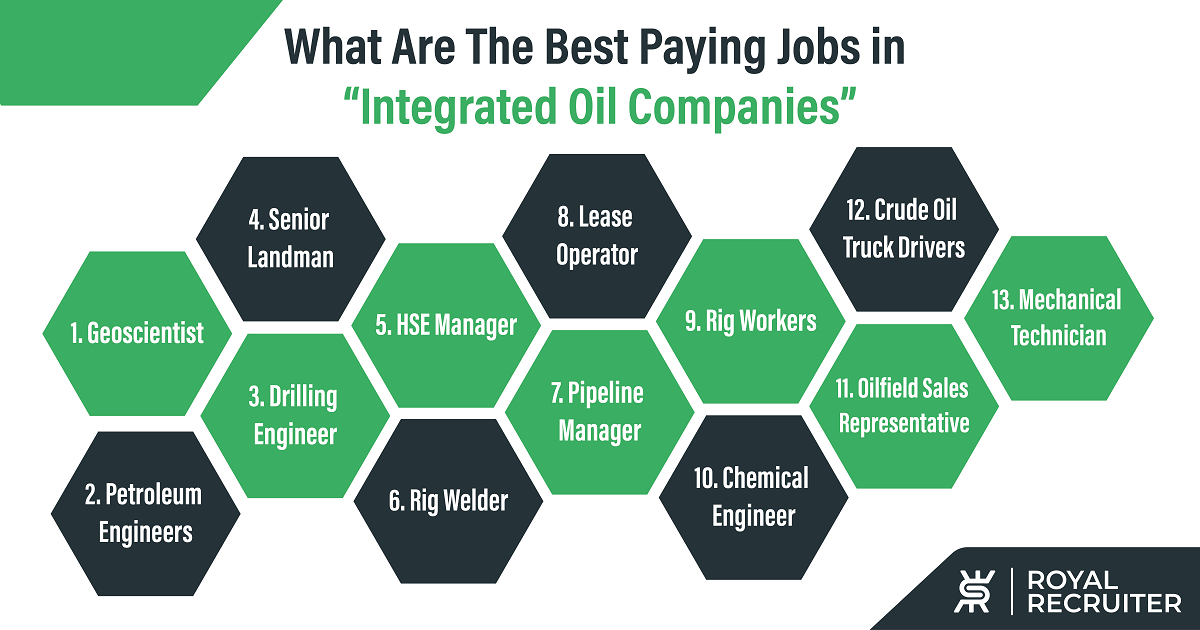Best Paying Jobs In Integrated Oil Companies

In This Article
Are you looking for the Best Paying Jobs In Integrated Oil Companies? Find the Best Paying Jobs In Integrated Oil Companies here and prepare to land a job
One of the most lucrative career paths in today’s world belongs to the oil and gas industry. This industry isn’t the same as before because this industry has been going through lots of changes for the last few decades.
As a result, more and more best-paying jobs are emerging in integrated oil and gas companies. And integrated oil and gas industry has become well known for offering the best-paying jobs in the job market.
You will discover some of the best-paying jobs in integrated oil companies; what are the duties and requirements to get those jobs?
What Is Integrated Oil Companies?
Integrated oil companies are involved in overall oil production activities. So what does an integrated oil company do? Let’s find out:
- Land exploration
- Surveying
- Oil & gas extraction
- Oil & gas Refining
- Production
- Transportation & distribution
- Marketing

What Are The Best Paying Jobs in Integrated Oil Companies
Average salary range: $88,000 to $124,000 annually
Geoscientists are one of the most vital parts of all integrated oil & gas production companies and rank among the best-paying jobs in this field. A geoscientist’s role in integrated oil companies is examining and studying the earth’s crust, such as water, rocks, and minerals, of potential lands to find natural resources.
Average salary range: $88,000 to $120,000 annually
After discovering a probable underneath oil reservoir, petroleum engineers design plans to extract oil from the soil in the best way possible. They are also responsible for choosing the kind of equipment that will be used for oil extraction.
Average salary range: $78,000 to $108,000 annually
The duty of drilling engineers is to install, design, and test the drilling equipment to extract oil and gas underneath the soil. They also supervise the existing drilling machinery & wells and ensure that they’re functioning efficiently.
Average salary range: $79,000 to $122,000 annually
People often don’t see a senior landman in oil extraction facilities because of their job nature. The main duty of a landman is to negotiate with landowners to get permission for the oil company to drill on their land.
They handle all the legal procedures and contracts between landowners and companies.
Average salary range: $74,000 to $93,000 annually
HSE stands for health, safety and environment. An HSE manager plays an important role in terms of safety and reducing risks. Because HSE managers ensure the drilling facilities are safe, healthy and environment friendly by preparing safety plans for the entire oil rig and implementing them all over the workplace.
Average salary range: $48,000 to $77,000 annually
Rig welders are one of the best-paying jobs in integral oil companies, which doesn’t require a university degree! And their role is also critical in this sector as they repair, construct and bond all types of equipment and tools used for oil extraction and storage.
Average salary range: $85,000 to $114,000 annually
From oil testing to extracting to storage, pipelines are integral tools in the oil and gas production industry. Pipeline managers monitor, troubleshoot and maintain the pressure of pipelines, and create blueprints for pipeline installation.
Average salary range: $46,000 to $72,000 annually
Lease operators in oil rigs monitor all the pumps, tools and equipment used in oil extraction. They keep records of the amount of oil and gas extracted from each pipeline, monitor the pressure, and inspect and repair oil leaks on pipelines or equipment.
Average salary range: $45,000 to $71,500 annually
Rig workers do the roughneck jobs in integrated oil production. They do a variety of tasks in oil fields. Their responsibilities range from installing, troubleshooting, cleaning, moving, and operating mining and drilling equipment.
Average salary range: $70,000 to $132,050 annually
When crude oil or fossil fuels are extracted from the earth, they come in an unusable form. Their job is to use the perfect combinations of chemicals while extracting crude oil from the earth and transforming it into a usable material such as diesel, octane, etc.
Average salary range: $70,000 to $132,400 annually
After refining and storing oil & gas, they are ready to be sold. Oilfield sales representatives bring potential buyers for integrated oil companies. They also figure out plans to maximise sales for a company.
Average salary range: $43,000 to $76,000 annually
Crude oil truck drivers transport oil from the extraction site to storage, distribution center, or seller. Other duties of their include loading/unloading, documenting log, basic troubleshooting, and vehicle inspection.
Average salary range: $41,000 to $69,000 annually
Mechanical technicians have duties throughout the oil field. Mechanical technician repair and inspect equipment such as permanent downhole gauges, motors, drilling machines, and compressors.
Requirement To Get A Job In Integrated Oil Companies?
Requirements in integrated oil companies depend mainly on position.
Below are the minimum requirements for jobs in integrated oil companies:
- Trade Certifications or High School Diplomas
For entry-level or roughneck jobs, you must complete trade programs or education similar to a high school diploma. However, few specific positions, such as electrician, technician, and welding, mandates trade certification.
- University Degree
Roles like Drilling engineer, project manager, sales representative and mining engineering require university degrees which can be either a Bachelor’s or a Master’s degree.
Is Integrated Oil Companies A Good Career Path?
Yes, integrated oil companies are an excellent lucrative career path as this is a vast industry with many high-paying jobs, numerous benefits, and career advancement facilities.
Additionally, getting a job in integrated oil companies is relatively easy in this sector since having a college or university degree isn’t mandatory to land a best-paying job.
Is It Mandatory To Work In Offshore In Integrated Oil Companies?
Requirements could vary based on companies but according to our findings not every company mandates workers to work in both on and offshore oil facilities.
You can either work in onshore or offshore it’s wholly upto company and you.Yes, especially if you do roughneck jobs (i.e., entry-level), then you’ll require to do a good amount of physical labor.Requirements could vary based on companies, but according to our findings, not every company mandates workers to work in both on and offshore oil facilities.
You can either work onshore or offshore; it’s wholly up to the company and youCareer advancement relies on experience and skill. If you can show you’re worthy of getting promoted to higher roles, most integrated oil companies will promote you to higher roles and won’t bother whether you’ve higher education.You’ll get a secured career in integrated oil companies that will last very long because of the vast usage of oil and gas. Also earn a high salary.As per American Petroleum Institute, there are more than 9.8 million jobs available in integrated oil companies.Top Integrated Oil Companies jobs near you




